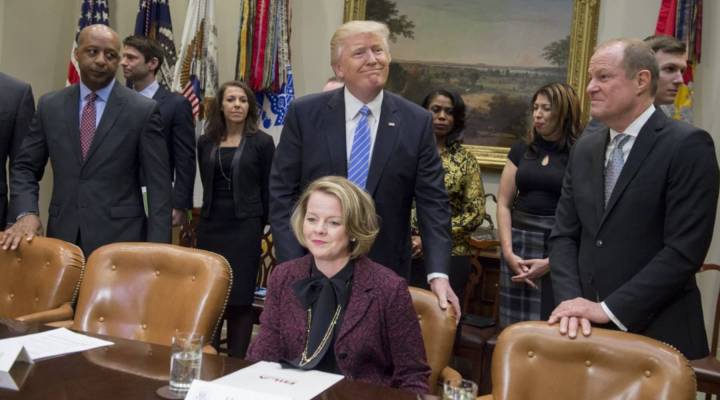
Tariffs come for fleece, send Jo-Ann CEO to Washington
Tariffs come for fleece, send Jo-Ann CEO to Washington

Jo-Ann arts and crafts stores customers got an unexpected email on Aug. 21:
Every day, we are inspired by the creativity and ingenuity of you, our customers.
Whether the things you make are created to enjoy a hobby, sold to sustain a passion, or given to support a charitable cause, the items you create are an important part of America’s culture.
I’m writing to you today to let you know that your ability to continue creating at an affordable cost is in jeopardy. Proposed tariffs on many of the items we sell will inadvertently place a tax on the “Made in America” products you make, which will hurt millions of individual crafters along with charitable organizations and small businesses.
Together, we can make a difference by encouraging Washington, D.C., to stop these tariffs before they take effect. Today, we, as a company, joined a campaign to support makers across America in speaking out.
The email, which went on to urge customers to sign a petition fighting the latest round of U.S. tariffs on $16 billion worth of Chinese goods, was from Jill Soltau, CEO and president of Jo-Ann Stores. On Thursday, August 23, Soltau went to Washington to testify against the tariffs in front of the U.S. Trade Representative. Marketplace host Kai Ryssdal called her up to talk about what these tariffs could mean for beloved Jo-Ann staples like yarn and fleece fabric. The following is an edited transcript of their conversation.
Kai Ryssdal: We were intrigued by this idea you had of urging your customers to get involved in this tariff discussion. Tell me how you came to the decision to involve your customers.
Jill Soltau: Well, certainly when we read this newly released list of tariffs, we kind of wondered how did fabric and yarn end up on a list that was more of a high-tech debate with China’s focus on 2025. And who better to create the awareness and express their passion about what they do every day with these raw materials that we import from China into the U.S. than our own customer base?
Ryssdal: Are you getting any pushback from those customers? I mean, some of them may be Trump supporters, they may be supporters of these tariffs.
Soltau: Well, we have heard from tens of thousands of customers through the coalition madeinamericatax.com. They are very supportive of it and this is not a political statement on behalf of Jo-Ann. This is very nonpartisan. This is creating the awareness that this could actually hurt products that are made in America because everything that our customers make with the products they buy from Jo-Ann that are imported from China are in fact made in America.
Ryssdal: With these tariffs, the theory is, of course, that they will protect Americans and American businesses. You’ve got a whole bunch of small businesses, though, that are your clients and your customers. What do you tell those people who buy from you about these tariffs? Because my guess is that you’re going to pass on the costs, right?
Soltau: Well, we are very concerned about our customers who are entrepreneurs and small business people. Over 20 percent of our customer base fall into that category. We are going to do everything in our power to manage through these increases should the tariffs pass, but it’s likely based on the sheer magnitude of them that we will have to pass on some cost increases to them. We are concerned because their customers will then have the option of choosing a foreign-made product that’s imported into the United States that doesn’t have the similar tax on it.
Ryssdal: So that’s where I was going to go next, which is China is certainly a source for a lot of fabrics and those kinds of items that come into this economy. Where else are you going to go so that you can supply your customers?
Soltau: Well, we are looking at every possibility. If I use the example of fleece fabric, this is a fabric, we sell 40 million yards of fleece fabric every single year.
Ryssdal: Fleece like those fleecy jacket things or what?
Soltau: The fleecy jackets, the blankets. I think every youngster under the age of 15 has probably made a tie blanket in their life. And there’s very few factories that can make this fabric, especially to meet our quality requirements as well as our cost requirements and the quantity that we need. It would be 18 months minimum for someone to set up a factory in order to make the fleece. I would say it would be maybe inside of a decade that someone could get to that scale.
There’s a lot happening in the world. Through it all, Marketplace is here for you.
You rely on Marketplace to break down the world’s events and tell you how it affects you in a fact-based, approachable way. We rely on your financial support to keep making that possible.
Your donation today powers the independent journalism that you rely on. For just $5/month, you can help sustain Marketplace so we can keep reporting on the things that matter to you.


















